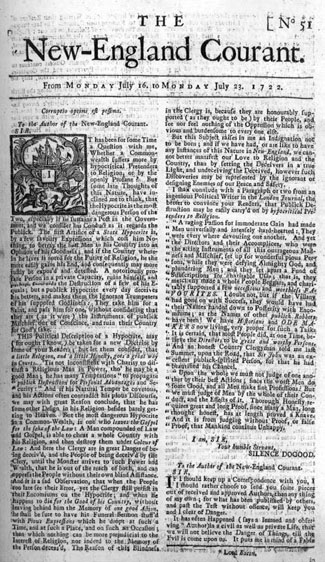
Andrew Carnegie
Alfred
Aristotle
Charlemagne
Dante
Franklin
Hegel
Kant
Laplace
Lincoln
McKinley
Milton
Newton
Plato
Socrates
Virgil
Washington
Carnegie Building
|

 |
About the image: This image is of issue 51 of The New England Courant, from Monday July 16 to Monday July 23, 1722. On the front page is a letter from Silence Dogood.
During the eighteenth century, many writers used pseudonyms to avoid prosecution for controversial views. Benjamin Franklin, always willing to express a controversial opinion, often resorted to the use of invented names. He used pseudonyms not only to remain anonymous, but also in order to present two sides of an issue, like the point-counterpoint style of journalism. Franklin’s pseudonyms were never just a name; he invented entire personalities for his characters. Sometimes the ‘writer’ was a woman; some writings were logical and persuasive, while others were written for humor; but in any case, they all wrote with a clear point of view. Some of these characters are listed below: |
- Silence Dogood — Franklin's first pseudonym, created when he was a teenager. This character was a widow of a country minister who expressed a love for the clergy and good men. She was also very critical and satirical especially when she would "observe and reprove the Faults of others." Franklin was 16 when he invented Mrs. Dogood, and between April and October of 1722, penned fifteen letters bearing Silence's name for his brother's newspaper The New-England Courant.
- Caelia Shortface and Martha Careful — These ‘ladies’ were the authors of several letters mocking Franklin's former employer Samuel Keimer, who, according to Franklin, had stolen some of his ideas. The letters appeared in the American Weekly Mercury, a competitor newspaper.
- Busy Body — These letters were also published in the American Weekly Mercury. Miss Body's letters were filled with local gossip and humorous looks at the relationships between men and women, as well as insults aimed at local businessmen.
- Anthony Afterwit — provided a humorous look at married life from a man’s point of view and appeared in Franklin's Pennsylvania Gazette.
- Alice Addertongue — Another gossipy woman whose specialty was spreading scandals about the prominent members of society in Franklin's Pennsylvania Gazette.
- Richard Saunders — Franklin's best-known pseudonym, Richard Saunders was the "Richard" of Poor Richard's Almanack. First published late in 1732, Poor Richard's Almanack is Franklin's most famous publication and lasted for twenty-six editions.
- Polly Baker — Franklin used Polly Baker to shine light on the double standard for men and women under the law. Like Franklin himself, Polly had illegitimate children; unlike Franklin, however, she was punished for it. Polly's fictional lovers, among whom were prominent businessmen, did not suffer for their transgressions.
- Benevolus — Benevolus was a pen name that Franklin adopted while in England. These letters tried to dispel some of the negative rumors made about the American colonists by British press. These letters were published in London newspapers and journals.
Picture courtesy of ushistory.org
PBS.
"Wit and Wisdom: Name that Ben," available from
http://www.pbs.org/benfranklin/l3_wit_name.html;
Internet; accessed 2 February 2005.
ushistory.org.
"The New England Courant," available from
http://www.ushistory.org/franklin/courant/index.htm;
Internet; accessed 2 February 2005.
back

|

